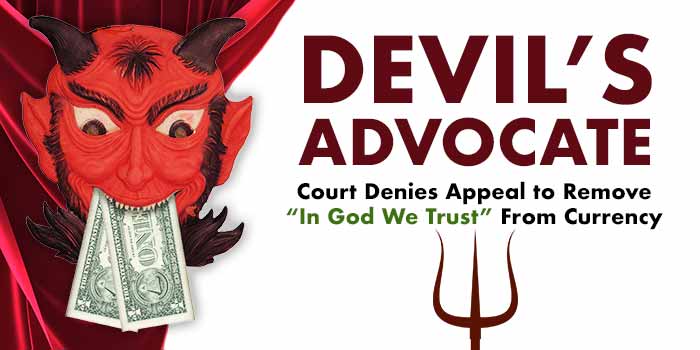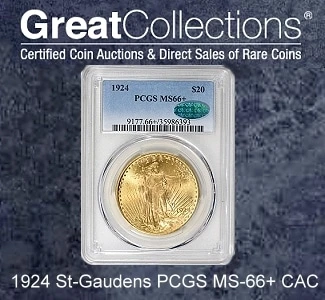
By Hubert Walker for CoinWeek ….
On May 31, the United States Seventh Circuit Court of Appeals in Chicago ruled against a man suing to remove the motto “In God We Trust” from the nation’s currency. Litigation had been ongoing since May of last year.
Kenneth Mayle, the 36-year-old plaintiff who describes himself as a non-theistic Satanist (meaning a Satanist who does not believe in the literal existence of Satan), originally brought the lawsuit to federal court because he sees the motto as spreading and supporting a religious view in opposition to his own beliefs. Mayle described the act of spending money with “In God We Trust” printed on it as a “submissive ritual”, one that his distrust of electronic debit and credit cards makes largely unavoidable.
Believing there to be little political will to change the law mandating the motto’s appearance on our money–and having examined the United States Supreme Court’s decision in Burwell v. Hobby Lobby Stores (2014)–Mr. Mayle decided that a lawsuit was the most effective way to go.
“Right now, you have a lot of politicians that are reflecting their religious views and laws and pushing toward the Trump mentality, nationalism,” he said. “Someone has to present the other side. You just can’t protest in the streets. You have to put things in front of judges.”
The lower court dismissed Mayle’s suit, stating that since the motto is not displayed prominently on our currency, people are not being forced to advocate religious beliefs that they do not share.
As a result, Mr. Mayle filed an appeal.
The Seventh Circuit’s latest ruling agreed with the lower court’s decision to dismiss, claiming that the motto “In God We Trust” is not a religious endorsement but is instead a “historical reminder” of our nation’s cultural heritage and therefore does not violate the Establishment Clause of the First Amendment to the Constitution of the United States. The Establishment Clause prohibits the Federal Government from giving preferential treatment to one system of belief over another through the law.
“I definitely have some problems with their logic,” Mr. Mayle said.
“In God We Trust” on Currency
While the motto “In God We Trust” first appeared on American coinage in 1864 on the Two Cent piece, its presence on U.S. paper money is a 20th-century phenomenon.

On November 11, 1953, Matthew R. Rothert, a member and eventual president of the Arkansas Numismatic Society, gave a speech about including the motto on paper notes. The speech was well-liked, spurring letters to President Eisenhower and Commerce Secretary Sinclair Weeks.
On June 7, 1955, Representative Charles Bennett (D-FL3) introduced H.R. 619 to the 84th Congress of the United States. His bill would require the Treasury Department to print “In God We Trust” on all United States currency as a bulwark against Cold War-era “imperialistic and materialistic communism”. With the help of then-Senator Lyndon Baines Johnson (D-TX), the bill was passed on June 29.
Here is the text of the law in its current form:
“At such time as new dies for the printing of currency are adopted, the dies shall bear, at such place or places thereon as the Secretary of the Treasury may determine to be appropriate, the inscription “In God We Trust” and thereafter this inscription shall appear on all United States currency and coins.”
–31 U.S.C. Section 324a
On March 22, 1956, House Resolution 396 was introduced. It proposed the use of “In God We Trust” as the national motto; until then, the Latin phrase “E Pluribus Unum (Out of Many, One)” had served in that role unofficially. The resolution passed on July 30 of that year.
The first note to bear the new national motto, the $1 Silver Certificate, entered circulation on October 1, 1957. The Federal Reserve Notes that we use today began to carry the phrase in the 1960s, with the $1 bill seeing release in 1964 – the 100th anniversary of the motto’s first use on American money.
By 1970, the law was challenged in federal court for the first time. In Aronow v. United States (1970), Stefan Ray Aronow sued the government in federal court, where he was found not to have standing to bring the suit in the first place. The ruling by the Ninth Circuit Court of Appeals in San Francisco agreed with the lower court, citing Massachusetss v. Mellon (1923). But this case is most famous for establishing the precedent, utilized in the Seventh Circuit Court’s May 31 ruling, that the motto “In God We Trust” is a secular reminder of the United States’ religious heritage and cannot be reasonably understood as an endorsement of Christianity.
The Fifth Circuit Court of Appeals in New Orleans came to a similar conclusion in Madalyn Murray O’Hair v. W. Michael Blumenthal in 1979.
* * *
Sources
http://www.chicagotribune.com/news/nationworld/ct-in-god-we-trust-currency-20180604-story.html
https://coinweek.com/us-coins/in-god-we-trust-a-brief-history/
https://www.treasury.gov/about/education/Pages/in-god-we-trust.aspx




